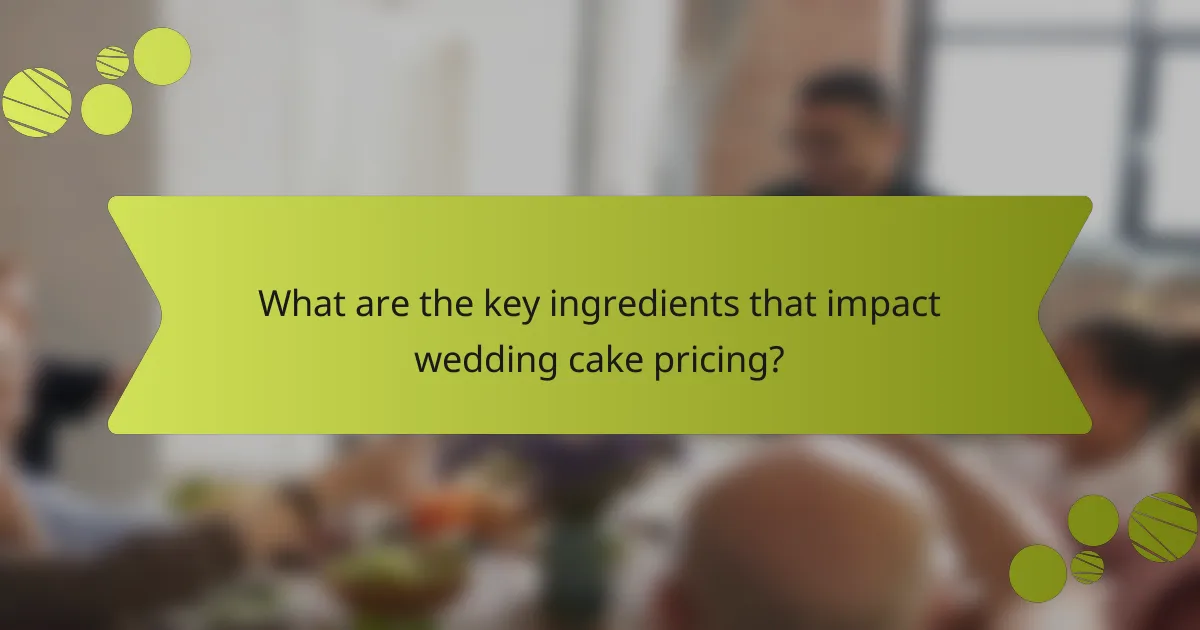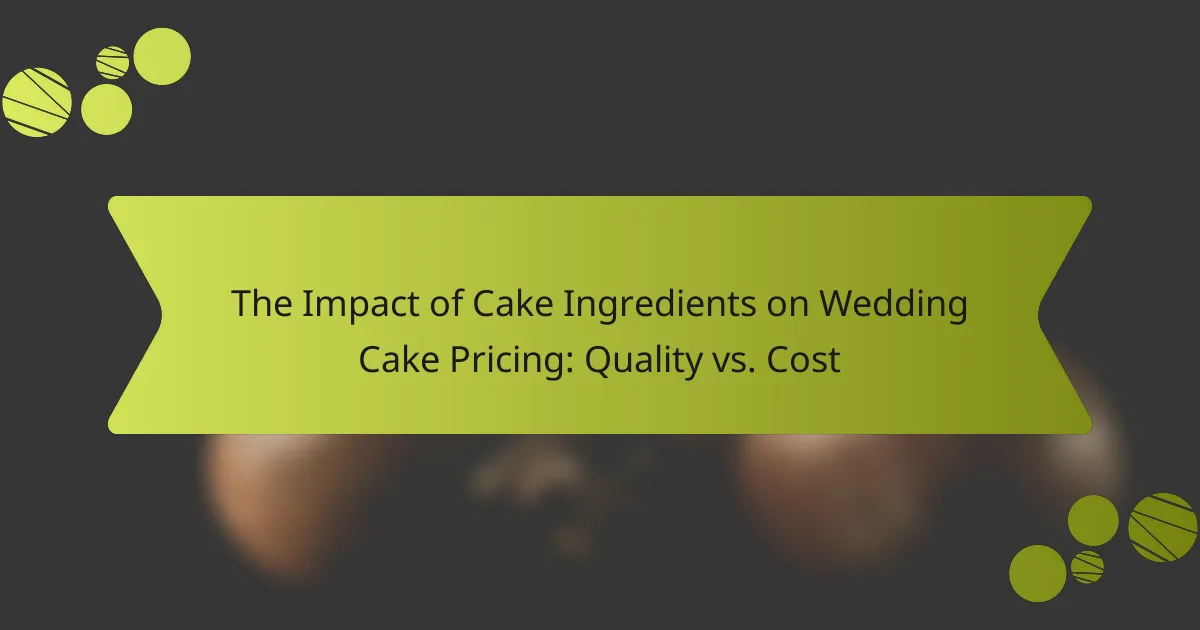The article examines the relationship between wedding cake ingredients and pricing, focusing on how the quality of key components like flour, sugar, eggs, butter, and specialty ingredients affects overall costs. High-quality ingredients, such as organic flour and premium chocolate, contribute to enhanced flavor and texture but also increase the cake’s price. The complexity of the cake design and the use of custom decorations further influence ingredient selection and budget. Understanding these factors helps couples navigate their wedding cake options and make informed decisions based on their budget and desired quality.

What are the key ingredients that impact wedding cake pricing?
The key ingredients that impact wedding cake pricing include flour, sugar, eggs, butter, and specialty ingredients. Flour quality affects texture and structure, influencing overall cake stability. Sugar contributes to sweetness and moisture, with premium sugars costing more. Eggs enhance richness and flavor, with organic or free-range options being pricier. Butter impacts taste and texture, with high-quality butter leading to better flavor profiles. Specialty ingredients like fondant, fresh fruit, and gourmet chocolate significantly increase costs due to their quality and sourcing. Each ingredient’s quality directly correlates to the final price of the wedding cake.
How do different cake ingredients affect overall costs?
Different cake ingredients significantly impact overall costs. Premium ingredients like organic flour and high-quality butter raise the price. Basic ingredients, such as all-purpose flour and margarine, are more affordable. Specialty items like fondant or imported chocolate can substantially increase costs. The choice of flavorings, such as vanilla extract versus imitation vanilla, also affects pricing. Seasonal ingredients may vary in cost depending on availability. Additionally, the quantity of ingredients required for larger cakes can further influence expenses. Overall, ingredient quality and type directly correlate with the final price of the cake.
What are the most common ingredients used in wedding cakes?
The most common ingredients used in wedding cakes include flour, sugar, eggs, butter, and baking powder. Flour serves as the primary structure for the cake. Sugar adds sweetness and moisture. Eggs contribute to the cake’s richness and stability. Butter enhances flavor and texture, while baking powder acts as a leavening agent. Additionally, vanilla extract is often included for flavoring. These ingredients are foundational in creating a traditional wedding cake.
How does the quality of ingredients influence pricing?
The quality of ingredients directly influences pricing in wedding cakes. Higher quality ingredients typically cost more due to their sourcing and production processes. For example, organic flour and premium chocolate are often more expensive than standard alternatives. Chefs and bakers may also charge more for cakes made with artisanal or locally sourced ingredients. This is because these ingredients often have better flavor and texture, leading to a superior final product. Additionally, the demand for high-quality cakes can drive up prices. According to a survey by The Knot, couples are willing to spend more on cakes made with high-quality ingredients. Thus, ingredient quality significantly impacts the overall cost of wedding cakes.
Why is ingredient sourcing important for wedding cake pricing?
Ingredient sourcing is crucial for wedding cake pricing because it directly affects the quality and cost of the final product. High-quality ingredients often come at a premium price, which increases overall costs. For instance, organic or locally sourced ingredients can significantly elevate the cake’s price due to their higher production costs. Additionally, the availability of specific ingredients can fluctuate seasonally, impacting pricing. Cakes made with rare or unique ingredients tend to be priced higher due to their exclusivity. Therefore, the sourcing decisions made by bakers play a pivotal role in determining the final price of wedding cakes.
What factors affect the availability of high-quality ingredients?
The availability of high-quality ingredients is influenced by several factors. These factors include agricultural conditions, supply chain efficiency, and market demand. Agricultural conditions such as climate, soil quality, and pest management directly impact ingredient quality. Supply chain efficiency affects how quickly and safely ingredients reach manufacturers. Market demand drives the availability of premium ingredients, as higher demand can lead to shortages. Seasonal variations also play a role, as certain ingredients may only be available at specific times of the year. Additionally, regulatory standards can affect ingredient sourcing, impacting quality and availability. Lastly, economic factors such as inflation and trade policies influence ingredient costs and accessibility.
How do seasonal ingredients impact wedding cake costs?
Seasonal ingredients significantly impact wedding cake costs. When ingredients are in season, they are typically more abundant and less expensive. This abundance leads to lower prices for bakers, which can reduce overall cake costs for couples. Conversely, off-season ingredients often require sourcing from distant locations, increasing transportation costs. These higher costs are usually passed on to the customer. Additionally, seasonal ingredients can enhance flavor and freshness, potentially adding value to the cake. Therefore, using seasonal ingredients can lead to cost savings while also improving quality.

What role does ingredient quality play in wedding cake pricing?
Ingredient quality significantly affects wedding cake pricing. High-quality ingredients typically increase the overall cost of the cake. Premium ingredients, such as organic flour or imported vanilla, are more expensive to source. Bakers often pass these costs onto consumers. Additionally, the use of fresh, natural ingredients can enhance flavor and texture. Cakes made with inferior ingredients may compromise on taste and presentation. This can lead to lower demand and, consequently, lower pricing. Research indicates that consumers are willing to pay more for cakes that use higher-quality ingredients. Thus, ingredient quality is a key factor in determining wedding cake pricing.
How do premium ingredients compare to standard ones in pricing?
Premium ingredients typically cost more than standard ones. The price difference arises from factors such as sourcing, quality, and production methods. For example, organic or artisanal ingredients are often priced higher due to their cultivation processes. Additionally, premium ingredients may offer enhanced flavors or textures, which can justify their higher cost. Research indicates that wedding cakes made with premium ingredients can range from 20% to 50% more expensive than those using standard ingredients. This price increase reflects the perceived value and quality that consumers associate with premium products.
What are examples of premium ingredients used in wedding cakes?
Examples of premium ingredients used in wedding cakes include high-quality vanilla bean, organic flour, and real butter. High-quality vanilla bean provides a rich flavor profile. Organic flour contributes to a more natural texture and taste. Real butter enhances the cake’s moisture and richness. Other examples are artisanal chocolate and fresh fruit. Artisanal chocolate adds depth and sophistication. Fresh fruit offers a natural sweetness and vibrant presentation. These premium ingredients often increase the overall cost of wedding cakes due to their superior quality and sourcing.
How does the use of organic or locally sourced ingredients affect costs?
The use of organic or locally sourced ingredients generally increases costs. Organic ingredients often have higher production costs due to stringent farming practices. Locally sourced ingredients can also be more expensive due to limited availability and smaller production scales. These factors contribute to higher prices for consumers. For example, a study by the USDA found that organic produce can cost 20-50% more than conventional options. Additionally, local suppliers may charge more to cover transportation and handling costs. Thus, while organic and locally sourced ingredients enhance quality, they also elevate the overall cost of wedding cakes.
What are the trade-offs between quality and cost in cake ingredients?
Higher quality cake ingredients usually come at a higher cost. Premium ingredients can enhance flavor, texture, and overall appearance. For example, real vanilla extract is more expensive than imitation vanilla. However, using imitation can reduce costs significantly. Cheaper ingredients may compromise the cake’s taste and quality. This can lead to customer dissatisfaction, especially for wedding cakes. A study by the American Culinary Federation found that ingredient quality directly affects consumer perception. Thus, bakers must balance cost and quality to meet budget constraints while maintaining customer satisfaction.
How can bakers balance ingredient quality with budget constraints?
Bakers can balance ingredient quality with budget constraints by prioritizing essential ingredients and sourcing them wisely. They should focus on high-quality flour, sugar, and butter as foundational components. Bulk purchasing can reduce costs without sacrificing quality. Bakers can also explore seasonal ingredients that are fresher and more affordable. Substituting certain premium ingredients with cost-effective alternatives can maintain flavor and texture. For example, using a blend of butter and oil can enhance moisture while lowering costs. Additionally, careful menu planning allows bakers to highlight signature cakes that justify higher quality ingredients. Implementing efficient production processes minimizes waste and maximizes ingredient use. This strategic approach enables bakers to maintain quality while adhering to budget limitations.
What alternatives exist for high-quality ingredients at lower costs?
Substituting high-quality ingredients can reduce costs without sacrificing quality. For example, using applesauce instead of butter can lower fat content and price. Greek yogurt can replace cream cheese, offering similar texture at a lower cost. Unsweetened cocoa powder is a cheaper alternative to high-end chocolate. Additionally, vanilla extract can be substituted with vanilla bean paste for significant savings. Flour blends can replace specialty flours, maintaining texture while being more affordable. These alternatives provide cost-effective ways to create wedding cakes without compromising on taste or appearance.

What are the implications of ingredient choices on wedding cake budgets?
Ingredient choices significantly impact wedding cake budgets. High-quality ingredients, such as organic flour and premium chocolate, increase costs. Specialty flavors and unique fillings also elevate prices. Conversely, standard ingredients reduce overall expenses. The complexity of the cake design influences ingredient selection and budget. Custom decorations often require more expensive materials. Additionally, sourcing local or seasonal ingredients may offer cost savings. Budget constraints can limit ingredient options, impacting overall cake quality. Understanding these implications helps couples make informed decisions.
How can couples plan their wedding cake budget effectively?
Couples can plan their wedding cake budget effectively by establishing a clear budget early in the planning process. They should research average costs for wedding cakes in their area, which typically range from $3 to $10 per slice, depending on ingredients and design complexity. Couples can prioritize their must-have features, such as flavor and design, to allocate funds accordingly. Additionally, they can consider the guest count, as this directly impacts the total cake cost. Choosing simpler designs or less expensive ingredients can also help reduce costs. Couples should communicate openly with their baker about their budget to explore options that fit within their financial plan. Comparing quotes from multiple bakers can provide insights into pricing and help identify the best value. Lastly, couples should factor in any additional costs, such as delivery and setup fees, to ensure a comprehensive budget.
What strategies can help manage costs while maintaining quality?
Utilizing bulk purchasing can significantly reduce ingredient costs while ensuring quality. This strategy allows bakeries to negotiate lower prices with suppliers. Implementing standard recipes can also maintain consistency in taste and quality. This reduces waste and minimizes variations in ingredient use. Training staff on efficient techniques can enhance productivity and reduce labor costs. Regularly reviewing suppliers ensures that bakeries source the best quality ingredients at competitive prices. Utilizing seasonal ingredients can also lower costs while enhancing flavor profiles. These strategies collectively help manage costs without compromising the quality of wedding cakes.
What tips can ensure a successful wedding cake selection?
Select a wedding cake that aligns with your theme and personal taste. Consider the cake’s flavor, texture, and design to ensure it complements your wedding. Schedule tastings with multiple bakeries to evaluate quality and variety. Ask about ingredient sourcing to understand the impact on pricing. Discuss dietary restrictions with your baker to accommodate all guests. Review portfolio samples to gauge the baker’s style and craftsmanship. Set a budget early to guide your selections and avoid overspending. Lastly, confirm delivery and setup details to ensure a seamless experience on your wedding day.
How can couples communicate their preferences regarding ingredients to bakers?
Couples can communicate their preferences regarding ingredients to bakers by having clear and detailed discussions. They should prepare a list of specific ingredients they want or wish to avoid. This list can include dietary restrictions, flavor preferences, and any allergies. Couples can also provide examples of cakes they admire to illustrate their taste. Scheduling a tasting session can help convey preferences through direct feedback. Additionally, written communication, such as emails or forms, can ensure all details are captured accurately. These methods enhance clarity and help bakers understand the couple’s vision. Clear communication is crucial for achieving the desired wedding cake outcome.
What should couples consider when tasting different cake options?
Couples should consider flavor, texture, and dietary restrictions when tasting different cake options. Flavor is crucial as it determines the overall enjoyment of the cake. Couples should sample a variety of flavors to find their favorites. Texture affects how the cake feels in the mouth. A good balance between moistness and density is important. Dietary restrictions, such as allergies or preferences for gluten-free or vegan options, should also be taken into account. Couples should communicate these needs to the baker. Additionally, presentation and design can influence the choice. A cake that looks appealing can enhance the overall experience. Finally, couples should consider the price point. Different ingredients can significantly affect the cost of the cake. This awareness helps in making an informed decision that aligns with their budget.
The main entity of this article is wedding cake pricing, specifically focusing on how various cake ingredients influence costs. Key factors discussed include the quality and type of ingredients, such as flour, sugar, eggs, and specialty items, which directly correlate to the final price. The article examines how ingredient sourcing, seasonal availability, and the trade-offs between quality and cost affect budgeting for wedding cakes. Additionally, it provides strategies for couples to effectively communicate their preferences and manage their cake budgets while ensuring quality. Overall, it highlights the importance of ingredient choices in determining the overall pricing of wedding cakes.
